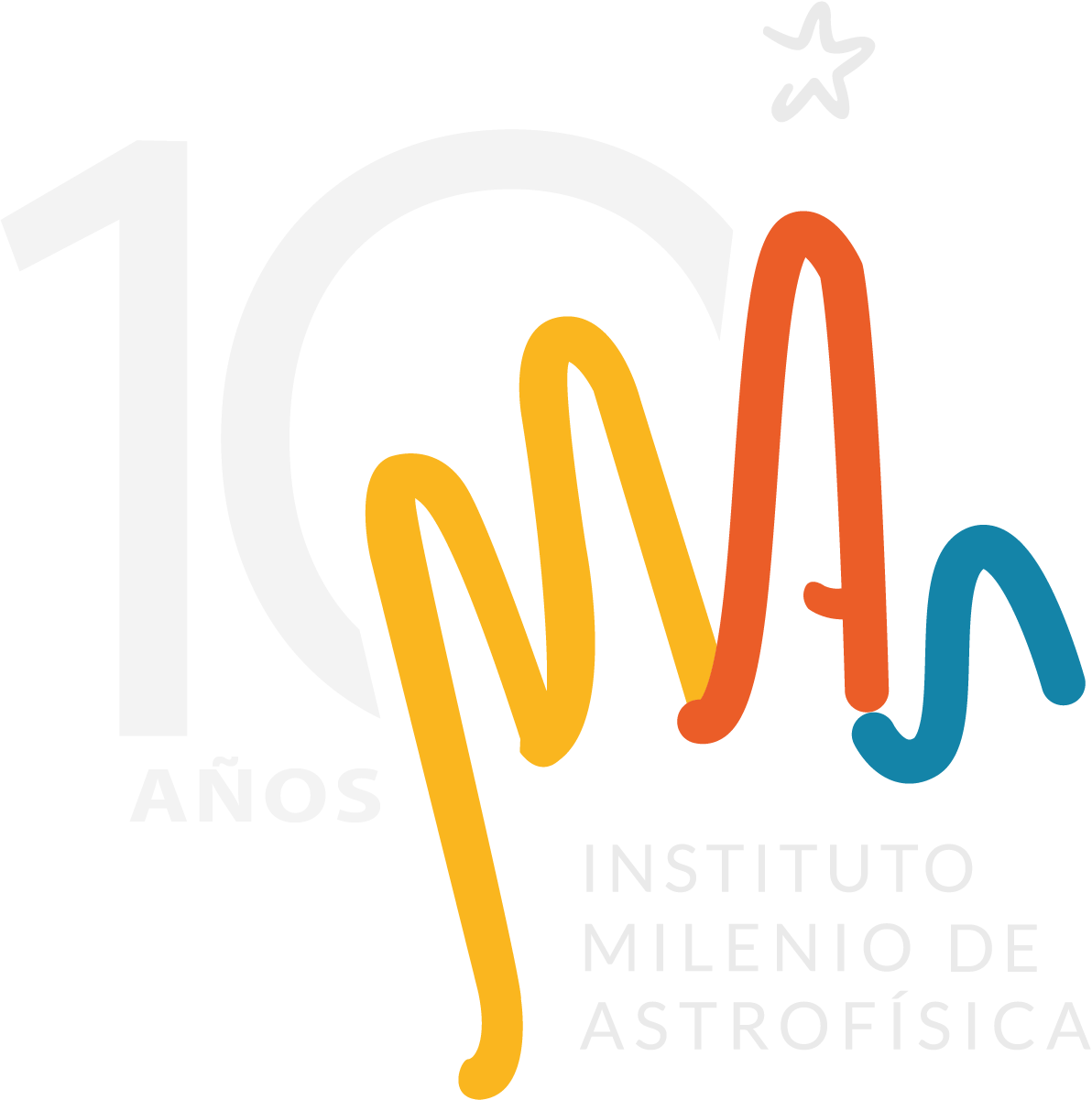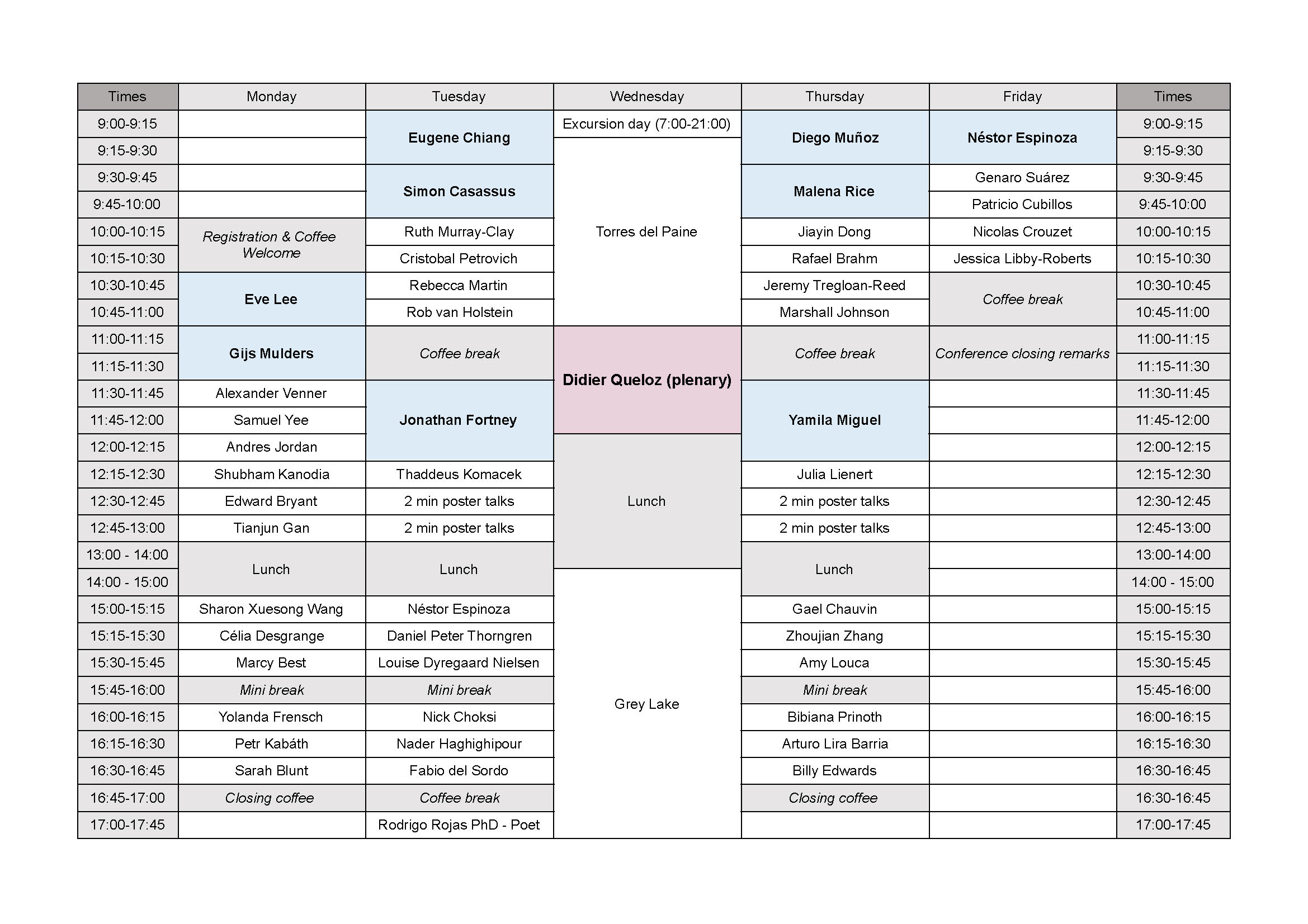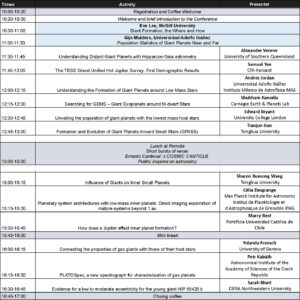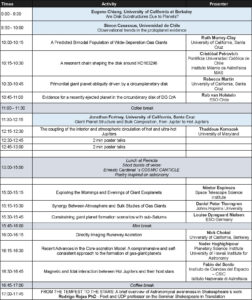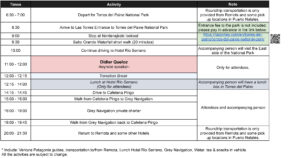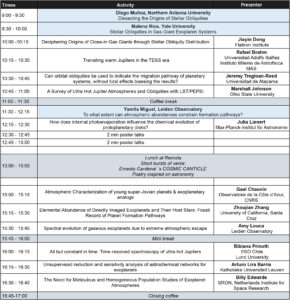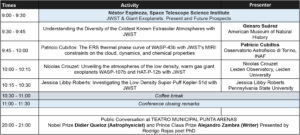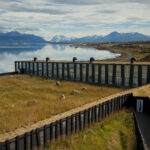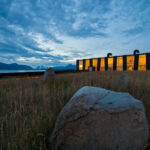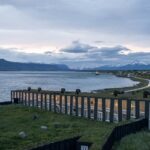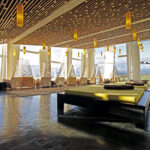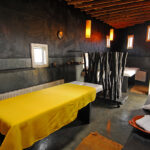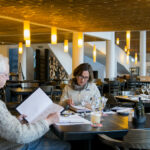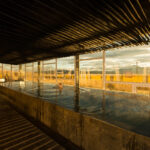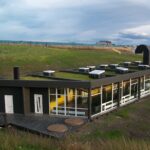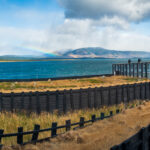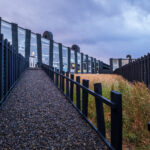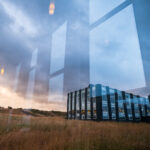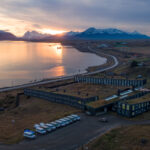Photo credit: Yuri Beletsky
OPAGA
Open Problems in the Astrophysics of Gas Giants
Dec 4 - 8 , 2023
Hotel Remota, Puerto Natales, Patagonia, Chile.
Scientific Rationale
Since the beginning of the exploration of exoplanets, gas giants have played an outsized role in the field. Despite the robust rate of discovery and characterization many of their properties have yet to be satisfactorily accounted for by formation and evolution scenarios. Even in our solar system we are still learning about some of their fundamental properties such as interior structure. In this workshop, to be held in Chilean Patagonia, we will focus on discussing open problems in the astrophysics of gas giants, dwelling on both the input from observational efforts and the theoretical frameworks required to tackle them. Some of the questions we will address are: How can the obliquities of gas giants be explained in terms of their dynamics and formation? How do giant planets manage to form around low mass stars? How are wide orbit gas giants formed? To what extent can atmospheric abundances constrain formation pathways? How can we learn about the interior of giant planets from remote observations and what do they tell us about planet formation mechanisms?
Invited Speakers
Didier Queloz (keynote speaker)
Diego Muñoz • Eugene Chiang • Eve Lee • Gijs D Mulders • Jonathan Fortney • Malena Rice • Néstor Espinoza • Simon Casassus • Yamila Miguel
CONTRIBUTED TALK
Alexander Venner • Amy Louca • Andrés Jordán • Arturo Lira Barria • Bibiana Prinoth • Billy Edwards • Cristóbal Petrovich • Daniel Peter Thorngren • Edward Bryant • Eli Galanti • Emma Nabbie • Gael Chauvin • Jeremy Tregloan-Reed • Jessica Libby-Roberts • Jiayin Dong • Julia Lienert • Louise Dyregaard Nielsen • Marcy Best • Marshall Johnson • Nader Haghighipour • Nick Choksi • Nicolas Crouzet • Patricio Cubillos • Petr Kabáth • Rafael Brahm • Rebecca Martin • Rob van Holstein • Ruth Murray-Clay • Samuel Yee • Sarah Blunt • Sharon Xuesong Wang • Shubham Kanodia • Thaddeus Komacek • Tianjun Gan • Yolanda Frensch • Zhoujian Zhang
poster
Poster size: The posters should be a maximum of 180 x 90 cm (height x length).
There are no poster printing facilities in Puerto Natales, so make sure to bring your poster with you.
Abigali Rodríguez Jiménez • Adriana Errico • Caprice Phillips • Carolina Charalambous • Célia Desgrange • Daniela Iglesias • Emma Nabbie • Fabio Del Sordo • Genaro Suárez • Harshitha M Parashivamurthy • Jan Eberhardt • Jozef Liptak • Juan Ignacio Espinoza Retamal • Marcelo Tala • Marco Antonio Petersem • Marina Cano Amoros • Megan Delamer • Michael K. Plummer • Michaela Vítková • Rob Wittenmyer • Stephen Lepp • Sydney Jenkins
Venue
OPAGA, Open Problems in the Astrophysics of Gas Giants, will be held in Puerto Natales, Chile, at Hotel Remota, a world-class refuge in the vast Patagonia.
Address:
Ruta 9 Norte km 1
6160000 5, Puerto Natales
Magallanes y la Antártica Chilena
Chile
Travel
OPAGA will take place in Puerto Natales located in the Chilean Patagonia, famous around the world for its amazing landscapes, vast forest, natural reserves, national parks, glaciers, and native wildlife.
The weather is usually very changeable and out on a trail you need to be able to take clothes off and put them back on. It’s best to bring some warm layers, even more important for the top layers to be wind- and waterproof in case of rain (keep in mind that summer is when Patagonia’s infamous winds pick up). Another important item you should pack for Patagonia it is a good and sturdy pair of hiking shoes. The trails are well maintained, but the rain and wind can make them slippery and unstable. For more info, please read the following blog: https://wanderlustdesigners.com/what-to-pack-for-patagonia/
All major credit cards are accepted almost everywhere. Smaller shops, kiosks, markets and more informal restaurants in remote areas may only accept cash, so make sure you have some with you as a back up.
FLIGHTS
To get to Puerto Natales there are two main airlines, Latam Airlines and Sky Airlines, with direct flights from Santiago, early in the morning (5:30 and 8 am, roughly), not so optimal to make a connection with most arriving flights from the northern hemisphere. Thus, the following are likely to be the main options to arrive, considering that the conference will start on Monday Dec 04:
a.- Arrive in Santiago on Saturday Dec 2nd, sleep over, and take one of the direct flights on Sunday Dec 03 morning (LATAM flight LA251 at 5:31 or Sky Airlines flight H2-421 at 08:00)
b.- Arrive in Santiago on Sunday Dec 3rd early morning and connect to the 10:00 am LATAM flight (LA83) to Punta Arenas. From Punta Arenas you need to take land transportation to Puerto Natales (aprox 3 hrs)
c.- Arrive in Santiago on Sunday Dec 3rd, sleep over in the city, and take on Monday Dec 04 the 5:50 am flight to Puerto Natales (LATAM flight LA 251). We will start the conference around 10:30 in order to allow people to arrive on this flight and check in at their hotels.
If you fly to-from Punta Arenas, the distance to Puerto Natales is 154 miles (247 km), and the best way to travel between the two cities is by car, either self-driving or, by bus or private transfer. We highly recommend to take buses; it is pretty straightforward—they usually make one stop at the airport if you’re traveling from the city. Most tourist buses have WiFi onboard and air conditioning and are equipped with phone chargers. It takes about three hours; it’s best to book in advance, and the two companies, Bus-Sur and Buses Fernandez, leave from either the Punta Arenas Airport or from downtown.
Please do not leave your travel arrangements for the last minute. Flights are filling up quickly because the high season is particularly strong this year.
OPAGA will provide complementary shuttle service from the hotels to the conference venue (Remota Hotel) in the morning and back to the hotels or downtown, in the afternoon, in case you want to have dinner. Schedule for the buses and restaurant recommendations will be announce soon.
INVITATION LETTER
If you need a formal invitation letter to get a visa, please send a request to the Local Organizing Committee via email (opaga@astrofisica.cl) with the following information:
– Full name
– Affiliation (University)
– Address
– Nationality
– Passport number
– Dates of travel to Chile
– Title(s) of paper(s) submitted and/or conference booking number
Please note that OPAGA does not accept any responsibility for any financial loss relating to inability of an individual to obtain the requisite travel documents. More information on applying for visa can be found at Chile Abroad.
Excursion
The registration Fee includes an excursion to Torres del Paine National and a navigation to the Grey Glacier in a private ferry.
These full-day activities will be held on Wednesday 6 and it’s an integral part of the conference.
It involves not only instances to mingle and promote scientific interactions, but also includes the keynote talk by Didier Queloz. In a sense, it replaces the conventional conference dinner by a lunch after the talk and cocktails at the Ferry at Lago Grey.
This is not meant to be only a touristic venue and because of the limited spots in the Ferry, we cannot accommodate partners/families in the trip. There are plenty of touristic options and services available. We will provide some links and contacts for people to make their own arrangements.
Organizers
SOC
Rafael Brahm (UAI), Bekki Dawson (Penn State), Néstor Espinoza (STScI), Thomas Henning (MPIA), Andrés Jordán (UAI), Yamila Miguel (Leiden), Ruth Murray-Clay (UCSC), Cristóbal Petrovich (PUC).
LOC
Rafael Brahm (UAI), Andrés Jordán (UAI), Cristóbal Petrovich (PUC), María José Sepúlveda (MAS), Sofía Gac (MAS)
Sponsors
Millennium Institute of Astrophysics (MAS, project ICN12_009)
CASSACA funds (project CCJRF2105)
University Adolfo Ibáñez (UAI)
ÁCRUX festival de poesía y astronomía
